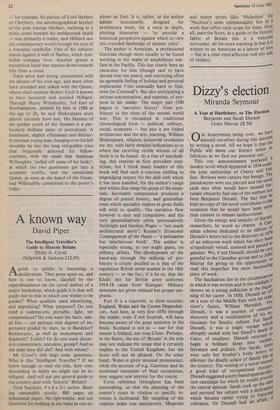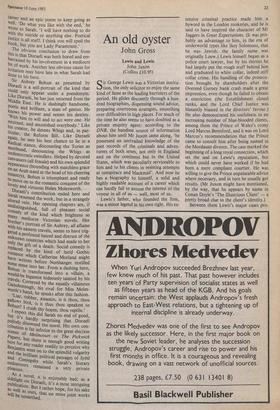Dizzy's election
Miranda Seymour
A Year at Hartlebury, or The Election Benjamin and Sarah Disraeli (John Murray £8.50) ur honeymoon being over, we have Vamused ourselves during this autumn by writing a novel. All we hope is that the Public will deem our literary union as felicitous as we find our personal one.'
This coy announcement prefaced a modest novel which appeared in 1834 under the joint authorship of Cherry and Fair Star. Reviews were cursory but benign. The pseudonyms were not pierced and the novel sank into what would have seemed for- tunate obscurity had one of the authors not been Benjamin Disraeli. The fact that he kept no copy of the novel contributes to the suspicion that he would have been more than content to remain undiscovered. Given the energy and tenacity of literarY researchers, he stood no chance. A Carl; adian scheme dedicated to an edition of Disraeli's letters led to the discovery in 1979 of an unknown work which has since been scrupulously vetted, assessed and passed as genuine. We, if not Disraeli, should be very grateful to the Canadian group and to John Murray for giving us the opportunity. t° read this imperfect but most fascin
piece of work. ating The fascination lies in the circuM
in stances n which it was written and in the sideligbeghtIti. It off ring on a young politician at the lf rung of his career. In 1830, Disraeli set soinsteartsourfioanf fiance, MvvidildhlaemEassit with his elder Disraeli, it was a journey of romantic discovery and a confirmation of his el thusiasm for Semitic culture. For Sarl d Disraeli, it was a tragic voyage whic.n abruptly ended with her fiancé'sdeath Cairo, of smallpox. Disraeli returned 10 begin a brilliant foray into literature and politics. For Sarah7ctiheetrYe were only her brother's lively letters to alleviate the deadly solace of family life in
, the country. The writing of a novel seemed a good kind of occupational
Disraeli suggested a story based upon an vide Lion campaign for which he would Pro .‘ 1,1 the central episode. Sarah took up the I". e, theraPY and pursued her subject with a dedicat17, rwohleicrahnebeecafmnre Draitshraeerlitrhyaindg an affair, fraternal
career and an epic poem to keep going as well. `Do what you like with the end,' he wrote to Sarah. 'I will have nothing to do with the suicide or anything else. Poetical justice is all stuff. I think you will spoil the book, but you are Lady Paramount.' The obvious conclusion to draw from this is that Disraeli was both bored and em- barrassed by his involvement in a mediocre bit of work. Another less obvious cause for irritation may have lain in what Sarah had done to his hero.
Sir Aubrey Bohun as presented by Disraeli is a self-portrait of the kind that could only appear under a pseudonym. Like Disraeli, he has just returned from the Middle East. He is dashingly handsome, poetic and brilliant, a man of genius. He knows his power and senses his destiny. With him to will and to act were one. He returned, and astonished everybody.' Like his creator, he detests Whigs and, in par- ticular, the Reform Bill. Like Disraeli again, he sees his best chance to lie in a Radical stance, discounting the Tories as moribund, denouncing the Whigs as undemocratic swindlers. Helped by devoted canvassers (all female) and his own splendid appearance (bounding with matchless grace on an Arab steed at the head of his cheering tenantry), Bohun is triumphant and ready lovely move on to the romantic conquest of the lovely and virtuous Helen Molesworth. Disraeli's contribution ended here and Sarah resumed the work, but in a strangely altered vein. Her opening chapters are, if undistinguished, full of pleasant social comedy of the kind which brightens so many mediocre Victorian novels. Her brother's portrait of Sir Aubrey, all aflame with his eastern travels, seems to have trig- gered a profound hatred and distrust of the unknown countries which had made to her only the gift of a death. Social comedy is replaced by the kind of lurid Gothic romance which Catherine Morland might have written before Northanger instilled some sense into her. From a dashing hero, Bohun is transformed into a villain, a would-be bigamist hideously tainted by his travels. Cornered by the equally villainous Gainsborough, his rival for Miss Moles- worth's hand, he speaks after this fashion. Liar, robber, assassin, is it thou, thou gallows bird, is it thus thou speakest to Bohun? I crush thy hopes, thou reptile.' expect this did Sarah no end of good, but it's hardly surprising that Disraeli Politely disowned the novel. His own con- tribution is far inferior to the great election scenes of Melincourt or The Pickwick Papers, but there is enough good writing here for any reader readily to perceive why Benjamin went on to the splendid vulgarity and the brilliant political passages of Sybil and Coningsby while Sarah's literary
endeavours remained a very private Pleasure.
As a novel, it is enjoyably bad; as a sidelight on Disraeli, it's a most intriguing publication. But I rather hope, for his sake as well as ours, that no more joint works will be unearthed.







































 Previous page
Previous page